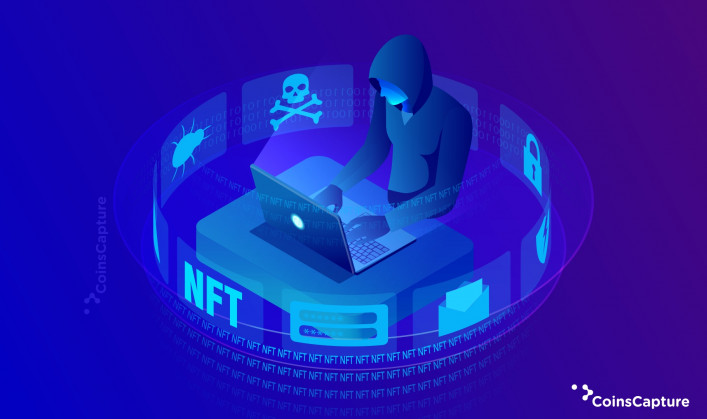7 November 2025
4 Biggest NFT Scams that Newbies Should Beware
During the middle of July, Verified Market Reports estimated that the worldwide NFT industry was worth roughly $11.32 billion and was on track to exceed $232 billion by 2030. Given the amount of cash changing hands, you can bet that thieves will attempt to make off with as much as they can. Rolling Stone warned its readers at the beginning of 2022 to treat everybody as a potential victim of a Non-Fungible Token fraud unless proved innocent. Ever since the beginning of the blockchain business, experts have been warning NFT dealers about the frequency of virtual frauds.
Also Read: Top 5 Mobile NFT Games To Earn Cryptocurrencies
Following are the 4 biggest NFT Scams that newbies should be aware of:
1. Rug Pull Scam (Old Pump-to-Dump Scam)
The Rug-Pull scam, or the old "pump and dump" in its stock market incarnation, is a trap wherein Cryptocurrency designers deceive new investors about the prospects of a fledgling NFT enterprise. Whenever the value of NFTs hits a predetermined level, the developers withdraw all of their funds from the system. Rug bridges will occasionally exploit popular figures on social media to attract their prey. According to a CNBC article from January, a group of investors is suing Floyd Mayweather and Kim Kardashian for fraudulent and securities violations for allegedly raising the price of a Cryptocurrency named EthereumMax that has no connection to Ethereum. NFT Now claims that NFT initiatives are subject to the same scrutiny from authorities as traditional investments like real estate as well as equities. It is unlawful to request funds for an investment initiative online and afterwards disappear without giving the money to the investors, just as it is criminal to do so on Wall Street.
Also Read: 6 Most Prominent Cryptocurrency Airdrops For 2022
2. Evaluate NFT Airdrop Carefully
A Twitter person with the handle @blabber dabbler said on September 21, 2021, that fraudsters had broken into his online wallet as well as snatched "The Currency" by Damien Hirst, a non-fungible token valued over $41,000 at the moment. Blockcast claims that @blabber dabbler fell prey to an airdrop hoax, a kind of fraud that first appeared in the realm of Decentralized Finance but has since become widespread in the NFTs industry. People who fall victim to this fraud will find tokens with a ".io" extension in their wallets, despite having never seen them or asked for them. This doesn't seem strange on the surface. CoinTelegraph claims that respectable NFT manufacturers often and lawfully employ uninvited airdrops for marketing as well as promotional purposes. Furthermore, in the case of airdrop frauds, when customers go to collect their NFTs or exchange them for Cryptocurrency, they are sent to a different portal. Afterwards, they will be rushed through a sequence of security questions and recovery words before they can claim their reward. At a certain point, the victims have unwittingly given the fraudsters access to their money.
3. Phishing Scams are Back
Phishing.org claims that the word "phishing" was first used by the Usenet newsgroup AOHell on January 2, 1996, making the practice over 25 years old. Fraudsters have adapted the age-old trick, which has traditionally used email, for the modern blockchain environment. Phishing schemes with misleading search engine advertising that seem to lead to trustworthy websites cost victims about $500,000 in November 2021, according to an estimate by Check Point Research. Similar to email phishing, Non-Fungible Token criminals pose as legitimate, well-known services like Phantom as well as MetaMask. If you want to install a virtual wallet like MetaMask or trade currencies on exchanges like Uniswap or Pancake Swap, be wary of ads that connect to suspicious websites. If a user lands on a malicious website and is asked to submit personal information, such as their private wallet key or a 12-word security seed phrase, they should immediately be on guard for possible virtual theft.
4. April Fool’s - They’ve Hacked the Discord Bots
Discord, similar to many other comparable sites, employs bots, automated software to carry out useful functions including greeting members, blocking disruptive individuals, and monitoring talks. The April issue of NFT Now revealed that hackers had taken over the Discord servers of many well-known NFT groups, including Nyoki Club, BAYC, and many others. The strike was timed appropriately on April 1st. The intruders took control of the groups' robots as well as utilized it to send out fake hyperlinks promising members special benefits for joining freshly created Non-Fungible Tokens. Furthermore, the Non-Fungible Tokens did not really exist, as well as the postings directed readers to phishing websites where they compensated, in some instances for thousands of dollars' worth of coins that did not exist.
Disclaimer: The author’s thoughts and comments are solely for educational reasons and informative purposes only. They do not represent financial, investment, or other advice.






